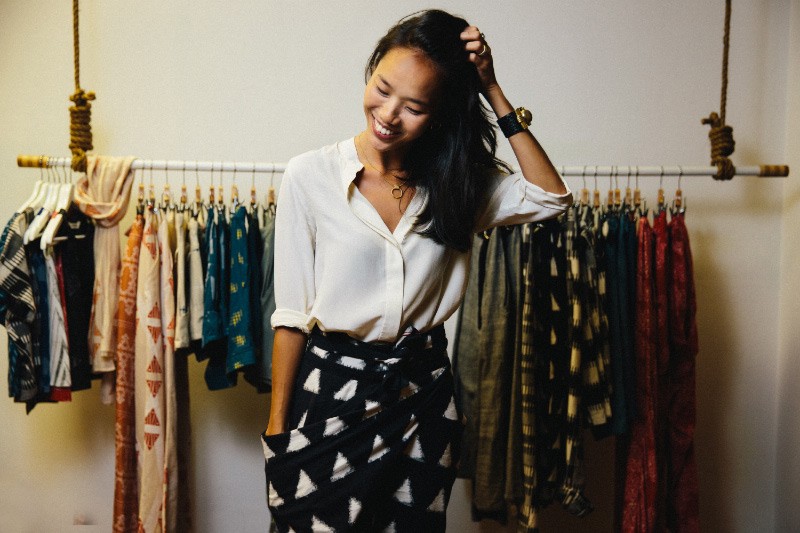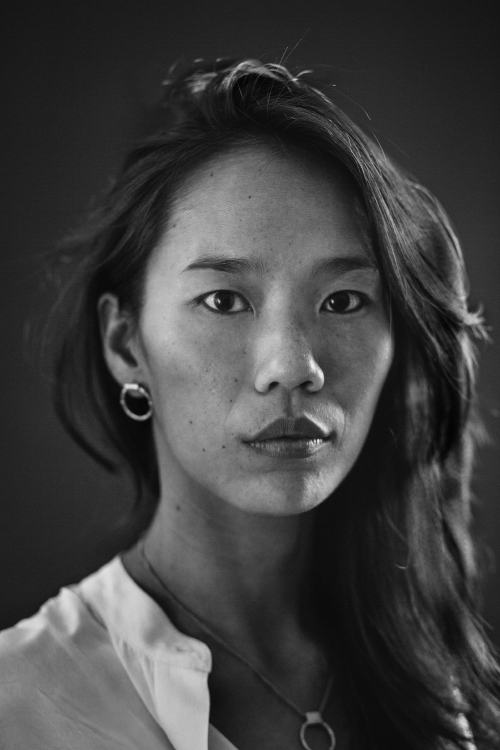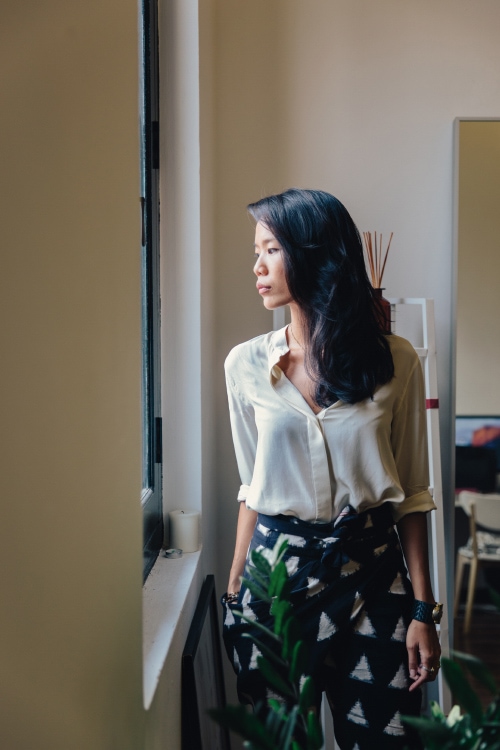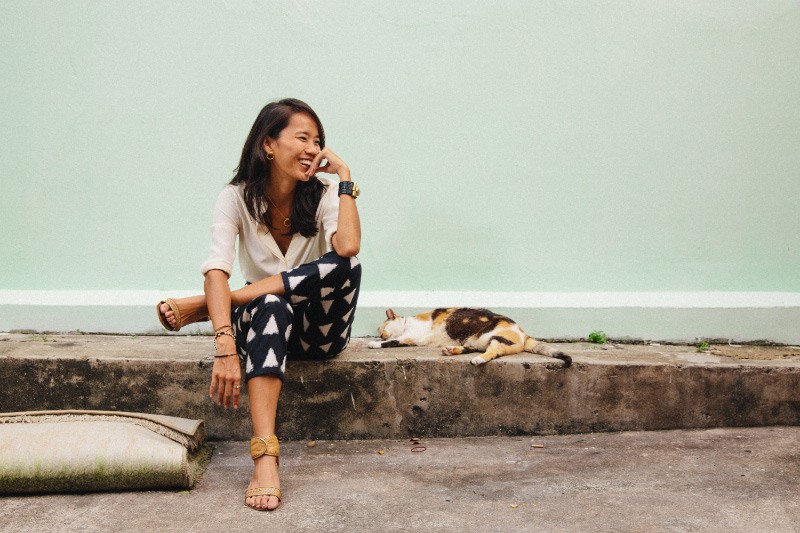Renyung Ho: Collaboration Through Craft
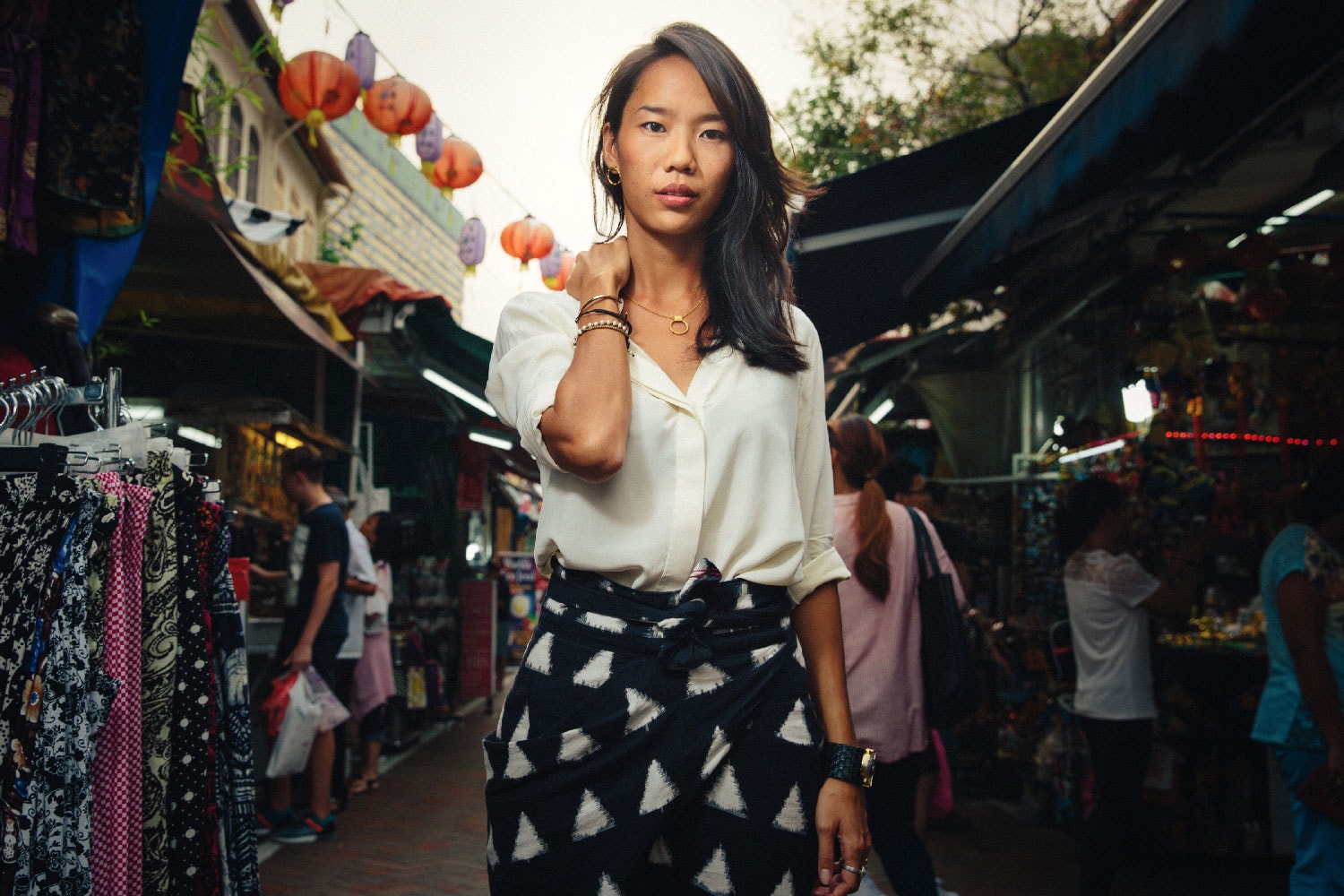
The haze is back in town. I squint in the smog as I make my way down Pagoda Street, squeezing through the crowd, passing the many souvenir stalls and Sri Mariamman Temple to get to MATTER’s Chinatown headquarters. I am tense, a little anxious and worried my mind is as foggy as the air. This is not my first time meeting Renyung Ho. From my previous encounters, I’ve always found her to be warm and approachable, but her rare combination of humility, strength and wisdom—gleaned from a variety of work and life experiences—is equally impressive and intimidating. Housed on the second floor of a shophouse, the MATTER office is relaxed and cosy. Just by the entrance, there is a spiral staircase leading up to the attic. While in the main area, Renyung’s tight-knit team of four sit almost back-to-back, semi-partitioned by an eye-catching clothing rack that features several pieces from the MATTER collection. I look for Renyung, and she is already seated comfortably in the kitchenette that doubles up as a meeting room. She smiles widely and immediately offers to pour me a drink of water from a recycled glass bottle. Renyung exudes radiance and cuts a svelte figure in a white blouse and monochromatic sideswept dhoti (the instantly recognisable pants from her clothing line). “There is a story behind everything I wear,” she says. Her social enterprise MATTER works with textile artisans in Asia to produce handcrafted travel wear—pants, jumpsuits and scarves—featuring a diverse selection of heritage prints. By building direct relationships with artisan partners, she also aims to connect them with broader markets to increase exposure for the work they do. MATTER is, in fact, Renyung’s third venture built around collaboration. After starting her career at Banyan Tree (her family-owned business), she went on to co-found Kennel, a collaborative workspace for entrepreneurs, and presently still co-organises Creative Mornings—a community lecture series for creatives. At these monthly talks, speakers discuss themes such as sex, love, money and empathy, while attendees gather and connect over breakfast and coffee. With so many innovative and challenging projects under her belt, it might seem that Renyung has always been confident of her abilities. Yet, as she sits across the table from me, she admits with candidness that she didn’t always know what she wanted to do. “It has been a long process filled with doubt, tears, self-blame, and confusion,” she explains. Renyung articulates her thoughts clearly, and is disarmingly frank about addressing her privileged background and the recent acquisition of MATTER by Banyan Tree. “Part of one’s journey is accepting your own context. This means accepting that I was born into a privileged family with an existing family business, being able to enjoy what I’m doing, and not feeling guilty about it. Ultimately, I need to make the best use of the resources I have, in an area I have a passion for—to make a difference in society.”
HUI WEN CHIN: You’ve had a very varied working life. How can you tell when a project is worth doing?
RENYUNG HO: When it’s been on your mind long enough that you will regret not doing it. Everything is an experiment—every meeting and every relationship. It is an experiment in the sense that you are putting yourself out there in an effort to see what comes back and how you can learn from it.
HUI WEN: How long had the idea been brewing before you decided to start MATTER?
RENYUNG: Five years. I met my co-founder Yvonne Suner in Mexico in 2009. We were working together at Banyan Tree and talked about the idea that year. Over the years, we’ve had different full-time jobs but would still meet up to do sourcing trips. It never fully kicked off because it was one of those things we had a common passion for and could see where it might go… but it just didn’t catalyse.
Having a business has always been a vehicle for fulfilling a larger purpose or making an impact.
HUI WEN: What finally made you start the business?
RENYUNG: It was a confluence of opportunity, timing and the right intention. And I knew if I didn’t give this a try, I would regret it. When you over-analyse and over-think it, you get into an analysis paralysis. So you just start—and you either give up halfway or you get signs that you should keep going. For me, having a business has always been a vehicle for fulfilling a larger purpose or making an impact.
HUI WEN: How do you know if you can create impact?
RENYUNG: When you believe you are the best person to execute your business idea, and you become so driven to make it work. I’ve had failures in the past where I wasn’t the right person to carry out the idea. And because of that, I also didn’t have the right continuing belief, motivation and perseverance to keep going. Oftentimes, failure is just giving up.
HUI WEN: And with MATTER, why are you the right person?
RENYUNG: Firstly, I’m a storyteller. Someone once called me a “visual poet”. I see connections and beauty in many disparate things. Hence, I am able to package imagery, thoughts and ideas into an engaging brand story. People can experience this brand story and have their world view transformed. Secondly, I have the privilege and resources. It has been said to me repeatedly, “Oh, you can only do this because of who you are.” But that’s a total validation of what I’m doing. If I can only do this because of my privileged background, then I should be doing it. That change in perspective was very important for me.
HUI WEN: So was there a point when you felt guilty about your privileged background?
RENYUNG: Massively. I definitely felt very guilty before. When you travel around Asia, you realise how privileged we are in general. But even just in Singapore, I’ve accepted that I am very privileged in terms of resources, not having to put food on the table, not having dependents, not having children to raise and not having to worry about financial issues. So, that allows me to focus on my dream and what I want to accomplish in life.
HUI WEN: Would you say guilt has been a motivating force in your life?
RENYUNG: I don’t think guilt is a good driver or motivation—it isn’t healthy. My motivation comes from what I fundamentally believe life should be all about. I ask myself every day: Am I making the most impact in the places that matter? I used to dream of working at the UN or with an NGO. I’d like to provide clean water and education to women and children, as well as support them through microfinance. There are so many problems in the world that the decision of where to put your time is quite difficult sometimes.
HUI WEN: How did you decide on social entrepreneurship as a way of creating impact?
RENYUNG: I studied sociology at University College London and took classes in civil society, economic development and philosophy. That combination of areas of study led me to do a thesis on social entrepreneurship. At that time, social entrepreneurship was like a rising tide in the UK and social enterprises were being incorporated as a legal entity. I also worked at the first and only hub in London back then. Being there, at the time when that conversation was starting to take place, created a facilitating environment.
HUI WEN: Before you did sociology, you took two years off school. How different would you be if you hadn’t done that?
RENYUNG: I always imagine life as an adventure book. You make a choice, you turn to page 13. You make another choice, you turn to page 25. I wish I could read all of them. Looking back, it does seem like a random selection of experiences: I was a volunteer, a writer, a translation person for a production house, a waitress and a retail assistant. But I would be hugely different if I hadn’t done all of it.
We strive for the same sense of community, resonance, connection and love, no matter what we do and where we are.
HUI WEN: What did you learn during that time?
RENYUNG: We strive for the same sense of community, resonance, connection and love, no matter what we do and where we are. Working in different jobs at a rapid succession gave me the exposure to different people and that compression made me feel the human condition strongly. There is something to learn from everyone you meet, and I’ve carried that principle with me until today.
HUI WEN: How were the volunteer experiences?
RENYUNG: Post-tsunami, in 2004, I went to a really badly-hit area of north Phuket. I distinctly remember standing on the shore with kilometres and kilometres of wastage—houses with walls where the watermark was above the windows and children’s shoes hanging on trees. I had this overwhelming sense of presence. I knew it was because of all the people who had died at that location very quickly. Another experience was at an orphanage where I got very close to a little four-year-old boy. The only thing he knew how to write was his name and he kept writing it over and over on my palm. These experiences really drove home the brutal fact that life is unfair. And that entrenched in me the view that if you have the means and the capacity to better someone else’s life, why not do it?
HUI WEN: How did your parents feel about the gap years?
RENYUNG: I drew up a plan on how I would spend my time and gave them progress updates periodically. They could see that the entire experience was a good thing. Thankfully, my family believes each of us should seek out our real purpose and meaning in life—some might call it our own “true north”.
HUI WEN: Was growing up with high-profile parents difficult?
RENYUNG: Someone said to me the other day that “every childhood is a difficult childhood”. There is no childhood that is more difficult than the other because it is a time when you become your own person. And the struggle to become your own person is tough for everybody. One issue I faced was people making comparisons between me and my high-profile parents. As such, I grew up in the spotlight, often getting attention for attributes that were not intrinsic to me and that made me develop a more reflective mindset.
HUI WEN: When you first started to work for Banyan Tree, what was your role there?
RENYUNG: My role was in pre-opening, so I travelled to different hotels three to six months before they opened. It was a great way to be exposed to the different parts of running a hotel: operations, building, hiring and training. I made sure there was brand consistency across all guest experiences, but in a way that also allowed the local flavour of each location to shine through.
HUI WEN: What have you learned from being in the family business?
RENYUNG: The hospitality business requires a lot of hard work. One of my roles was talking to the different heads of departments and general managers about the difficulties they were facing. I was only 22 or 23 at the time and I felt a lot of responsibility to fix things—but I couldn’t, which made me feel very demotivated. I didn’t yet understand that when people share their issues, it’s not always with the expectation that you will solve it. Listening and acknowledging is just step one. Back then, all I had was absorptive empathy: what someone felt, I would feel too. I didn’t know I had to give myself enough time to affect real change.
HUI WEN: How do you deal with issues differently now?
RENYUNG: I’ve transformed my raw empathy into a mature way of handling issues. I make choices about how I want to deal with problems. I might sit with you in silence, hear you out or ask questions that enable you to arrive at the answer for yourself. In some sense, I have more control and am not just absorbing.
HUI WEN: With the sale of MATTER, are you back in the family business? What was the discussion like, being acquired by Banyan Tree?
RENYUNG: The discussion has been about what MATTER can bring to Banyan Tree. Also, for me, it was important that MATTER had a greater platform and possibility for scale. Another core point was MATTER’s autonomy of retaining the team and keeping my role intact.
HUI WEN: Your team seems to have a great bond. How do you know if someone will be a good fit?
RENYUNG: I ask them about their motivations, work ethic and how they spend their free time because that gives me a good indication of their priorities. Not everyone is suited for a start-up, especially new graduates who may have preconceived notions that it is glamorous. Also, value alignment is key. As a small team, we interact constantly, and if people share similar values, there tends to be less friction.
It is important to have respect for the things people do not usually see value in, such as diversity and difference.
HUI WEN: What are MATTER’s core values?
RENYUNG: The first value is “respect”. It is important to have respect for the things people do not usually see value in, such as diversity and difference. The second value is “intention”. I try to do everything with the right intention for benefiting others. The third value is “collaboration”. The world has too many problems to solve on our own. It is difficult—unless you are absolutely brilliant—to be original, so collaboration is key if you want to get anywhere.
HUI WEN: What is your long-term vision for MATTER?
RENYUNG: I see MATTER as providing a transformative customer experience. We connect customers to the places where our clothes are made, and the people who make it, through our online stories and offline events. With that information, they are equipped to make better purchasing choices. This type of transformative experience can be extended to any industry. I see more expansion and greater growth in apparel, homeware and even a hospitality experience. Fundamentally, MATTER started with the goal to make craft sustainable. Right now, our impact is entirely on the supply chain—in terms of the number of employment hours for our artisans. I would do more capacity building—that means training a new generation of artisans, R&D innovation in traditional artisan processes, and a fund offering loans and grants to help build their businesses.
HUI WEN: Finally, how would you like to be remembered?
RENYUNG: I haven’t shared this with many people, but I would like to be known as a person who has helped people love each other more.
****
Edited by Wy-Lene Yap
